OPERATION SISO 2019: SEA SHEPHERD IN THE MEDITERRANEAN AGAINST ILLEGAL FISHING
THANKS TO THE CLOSE COLLABORATION AND SUPPORT OF AEOLIAN ISLANDS PRESERVATION FUND AND SMILEWAVE FUND, SEA SHEPHERD CONTINUES TO PROTECT THE ITALIAN WATERS AGAINST ILLEGAL, NOT STATED AND NOT REGULATED FISHING IN THE SOUTH TYRRHENIAN SEA.
The small-scale aeolian fishermen have been at the forefront, reporting the illegal activities.
OPERATION SISO 2019 begins, with the aim to protect the delicate ecosystem of the Aeolian Islands from unreported and unregulated illegal fishing. The M / Y Sam Simon will sail the waters of the South Tyrrhenian Sea in the coming months in close collaboration and coordination with the National Fisheries Control Center (CCNP) of the General Command of the Corps of Capitanerie and with the Guardia di Finanza. Sea Shepherd fights against IUU around the world, in the Aeolian Islands the activity focuses in particular on the use of ‘sp’ nets called “spadare”, a type of drifting pelagic net, which despite being banned worldwide in 2003 , is still used illegally in Italian waters for Swordfish fishing. The spadare in the years have killed a staggerting number of Sperm Whales, Turtles, Tuna, Swordfish, Sharks and Marine Mammals, due to its meshes, between 20 and 50 centimeters in size. Currently in Italy it’s permitted to use nets called “ferrettare”, nets similar in all to “spadare” but with smaller meshes (10 cm in diameter), that nevertheless represent a fishing system selective by size but not by species.
Operation SISO 2019 begins with a great success of the collaboration with the Italian authorities in particular with the aeronaval operational department of the Guardia di Finanza, in Calabria. The investigative activity from sea and land has led to the organization and conduct of controls on trawlers in front of Bagnara Calabra (Reggio Calabria), a place sadly known in history for the use of “spadare” drift nets. The operation began with the coordinated activity of the Sea Shepherd speedboats and of the Guardia di Finanza patrol boats, promptly intervening; this led to complete control of the fishing boats and of the nets used at night time. One of the two boats tried to get rid of the drifting net it was already using because it contained a dead Swordfish suffocated by the net that had completely trapped him. The Guardia di Finanza had all the activity under control; at the same time the Sea Shepherd “Vikings” boat proceeded to report the position of the abandoned network together with the lifeless Swordfish.
Andrea Morello – Campaign Leader:
“According to the UN, the Mediterranean Sea is the most overexploited in the world with 62% of fish stocks now collapsing. Industrial fishing and its numbers, including the bycatch *, are definitely impoverishing it with a serious risk of depletion of marine species that would put the entire human species at risk, being that we are directly dependent on the biodiversity present in the seven tenths of our blue planet. So it is natural for Sea Shepherd to defend our future by defending the Sea. The first patrol activity began in two areas of the Sea south of the Tyrrhenian called Alpha and Bravo. During the first week we traveled 1,460 miles, monitored an area of 14,250 square kilometers, for 550 hours of navigation; encountering legal fishing systems such as the longline * for the Swordfish and reporting to the Italian authorities the presence of illegal activities at sea. The collaboration with artisanal fishermen, created thanks to past campaigns in the Aeolian Islands and to the great work of the Aeolian Preservation Island Fund, has made control of the area very effective. Last year, with some fishermen, the aim of protecting the Sea and endangered species had finally been shared, confiscating 130 KM of illegal FAD in this archipelago. The union between the Neptune Fleet and those who have been working for generations in such delicate areas as the Aeolian Islands, will be able to create a triangular collaboration dedicated to protecting the Aeolian Archipelago and all the Lives that inhabit it; maximizing collaboration with law enforcement and bringing back justice where the crime took place. From the beginning of the year, in the south Tyrrhenian Sea, 10 Sperm Whales died, almost all of them with plastic in their stomachs; our action of recovering plastic and fishing equipment lost or left adrift illegally is therefore continuous. We aim our ships in defense of what we call “our customers”, and we will keep it up until a Marine Protected Area in the Aeolian Islands will be created, that can bring biodiversity and tradition back to sustainability. Thanks to the donations of our supporters and the wonderful people of the Aeolian Island Preservation Fund, we returned to the South Tyrrhenian Sea and we will remain to protect every life without compromise, measuring our success with the number of lives we will save. ”
The Aeolian Islands are heritage of UNESCO since 2000, they form an archipelago made up of seven islands, together with small islands and rocks touched by the sea. The islands are arranged in a horizontal Y-shape, with the rod pointing towards the west; all of volcanic origin the islands are located in the southern Tyrrhenian Sea facing the north coast of Sicily at Cape Milazzo from which they are less than 12 nautical miles away. (personalmente non includerei questa parte già presente lo scorso anno)
Luca Del Bono, Chairman of the Aeolian Islands Preservation Fund:
“Sea Shepherd is a key partner to the Aeolian Islands. We strongly believe that more patrols can discourage illegal activities and represent an effective weapon against the impoverishment of our sea. The small artisanal fishermen of the Aeolian Islands cannot compete with the large fishing boats and it is important that those who come to fish in these islands, do so respecting the existing constraints so that the biodiversity of the Aeolian sea is protected. “
Who is SISO? A young sperm whale who died in 2017, kept entangled in an illegal “spadara” net passing through the Aeolian Islands. The Coast Guard’s heroic attempt to free him for many hours could not save him. Siso was found lifeless along the coast of Capo Milazzo by the marine biologist Carmelo Isgrò, who preserved the skeleton keeping the net that killed him and the plastic found in his stomach, as a warning to future generations. Siso was the nickname of the friend who helped Dr. Isgrò recover the sperm whale, who died in a car accident in those days.
Photo of SISO beached at Capo Milazzo:
https://www.tempostretto.it/news/fauna-marina-milazzo-ritrovato-capodoglio-spiaggiato-capo.htm
______________________________________________________________________________________
Working with local Italian authorities including the National Fisheries Control Center (CCNP) of the General Command of the Corpo di Capitaneria and the Salina Coast Guard, the abandoned fishing net was identified and raised aboard the M/Y Sam Simon for inspection as part of Sea Shepherd’s Operation Siso. Five swordfish and a 2-meter long shark were found trapped and dead in the spadara, which is a type of fishing driftnet still widely used in Italian waters despite being banned worldwide in 2003. Floating at sea indefinitely, abandoned nets such as spadare can continue killing countless sperm whales, turtles, tuna, swordfish, sharks and marine mammals year after year. Commentary by Captain Thomas Le Coz.
Back in September 2017, limited by time and budget, we did a short trip to the Aeolian Islands to discover the area and understand the threats faced by this rich and diverse ecosystem. We started working with the Coast Guard and Guardia di Finanza, and were allowed to retrieve about 40 illegal Fish Aggregating Devices (FADs) which were littering the crystal clear waters surrounding the Aeolian Islands and causing a threat to marine wildlife.
This campaign was a great opportunity to meet locals and build up relationships with all the people involved in the preservation of the area.
In October 2018 we came back to once again confiscate illegal FADs. From sunrise to sunset the crew of the Sam Simon worked in shifts to retrieve as many FADs as possible and bring them back to shore for proper disposal. This was a collaborative campaign with the Aeolian Preservation Fund.
FADs encountered in the Aeolian Islands are quite different from the ones we find in other parts of the world. Usually, despite their simple appearance, FADs are actually high tech fishing devices which, when equipped with a satellite transponder, can send a multitude of information to the owner vessel, including the quantity of fish underneath. These FADs drift for weeks, all over the oceans, and put many marine species at risk of entanglement. Many of them are lost and wash up on beaches and reefs, creating pollution and damaging coral.
But in the Aeolian Islands they a lot more basic. FADs are anchored to the bottom in 1500 to 2000m of water and are composed of palm leaves and a couple of floats made up of plastic bottles or barrels. These FADs are “single use”, which means that at the end of the season the fishermen don’t bother picking them up, creating even more plastic pollution in an already highly polluted Mediterranean Sea. It’s sad to realise that hundreds of kilometres of sunken nylon lines from these old FADs are covering the bottom of the ocean, especially in the pristine-looking waters of the Aeolian Islands, and slowly degrade into microplastics then making their way up the food chain.
June is not the season for FADs, so this year we are focusing on an even deadlier piece of fishing equipment: drift nets, in particular ‘’spadare’’.
Finding and identifying the fishing boats using spadaras is not easy task. Fishermen who decide to be on the wrong side of the law are very creative and find any possible subterfuge to cover up their illegal activity. It takes time, patience and a little bit of luck to understand how they operate and catch them. That’s the purpose of Operation Siso 2. We know illegal nets are being used in the area because we came across abandoned ones (ghost nets) that continue killing animals. Hundreds of cetaceans and turtles endure a slow and painful death in these nets every year. They are the collateral victims of an unsustainable fishing technic that has been banned all over Europe for nearly two decades. Millions of euros have been given to drift nets fishermen since the early 2000s to convert or retire their boats, yet 20 years later the problem still persists.
We are lucky to have the support of the authorities, local conservation groups and even some fishermen. Only with this collaborative approach can we tackle this issue.
It’s a long and difficult battle we are in, but definitely one worth fighting for. We are committed to do everything we can to protect the stunning beauty of the Aeolian Islands and the wildlife of the Mediterranean Sea.
The video: https://www.facebook.com/seashepherdglobal/videos/623784194809902/
Foto:Flavio Gasperini / Sea Shepherd
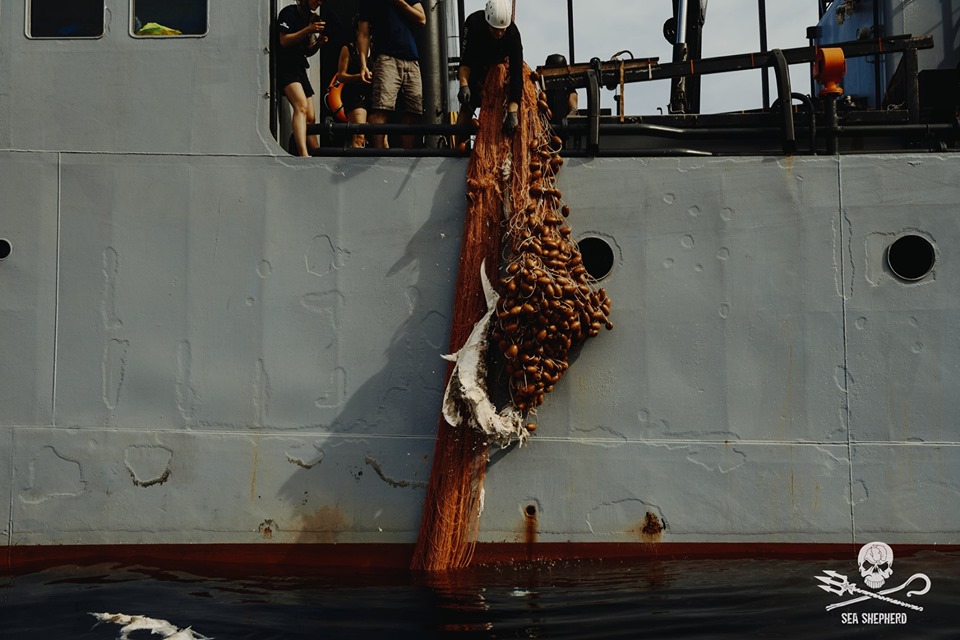
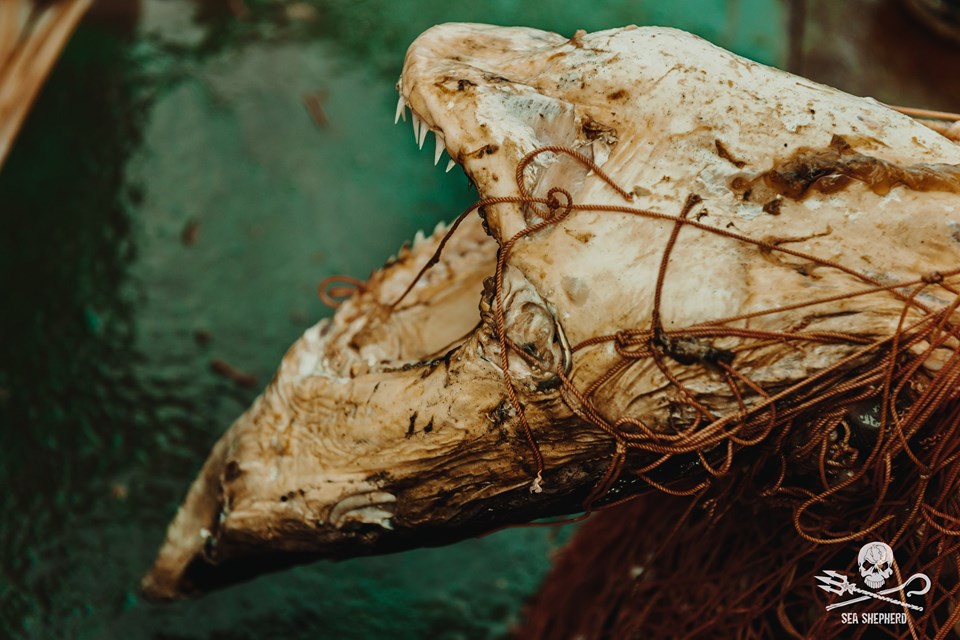
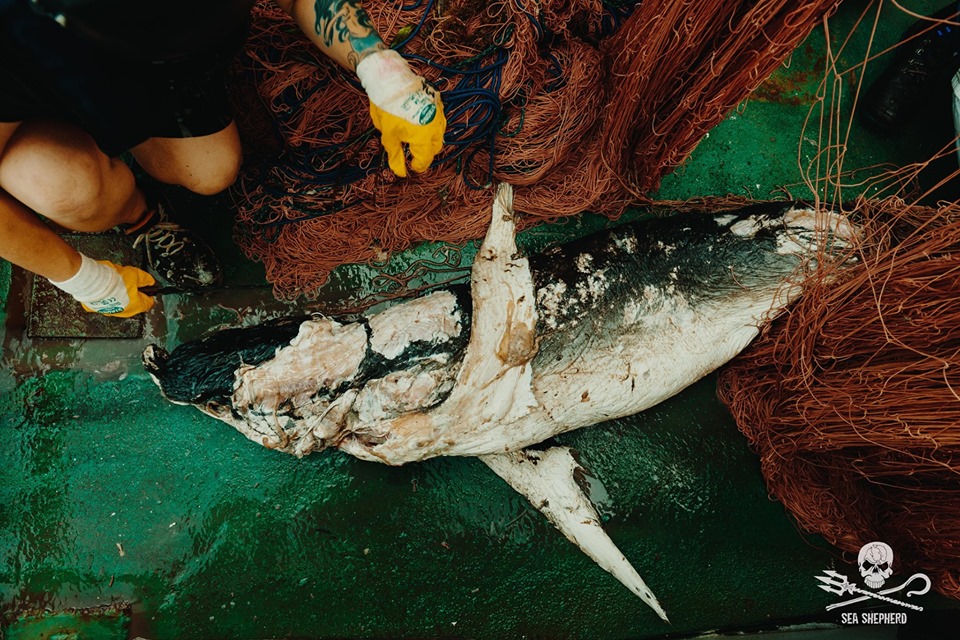
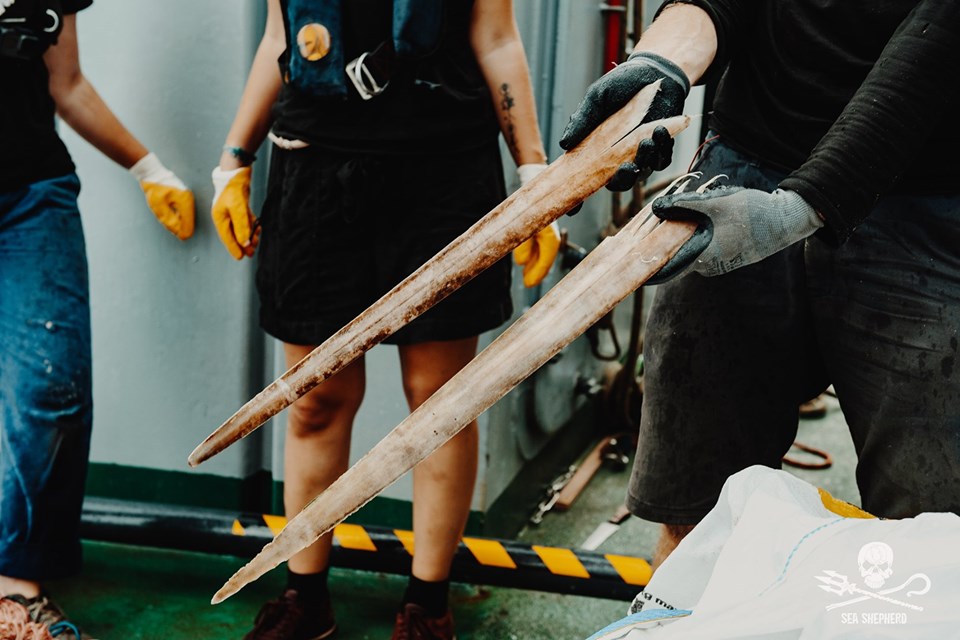
_________________________________________________________________________________________
The crew of the Sam Simon of Sea Shepherd Global has contributed to the liberation of a 3 meter long blue shark from an illegal drift net off the island of Alicudi, in the archipelago of the Aeolian Islands.
After an initial inspection with small boats to confirm the presence of the driftnet, the crew immediately coordinated with the Italian Coast Guard to pick up the national fisheries inspectors, on board the ship of the Maritime Authority of Catania. Once it was verified that the 5 km long net was a drift net, the crew proceeded to confiscate it.
Trapped between the meshes of the deadly net, 40 animals were found, including two sharks, one of which is alive and then released into the sea.
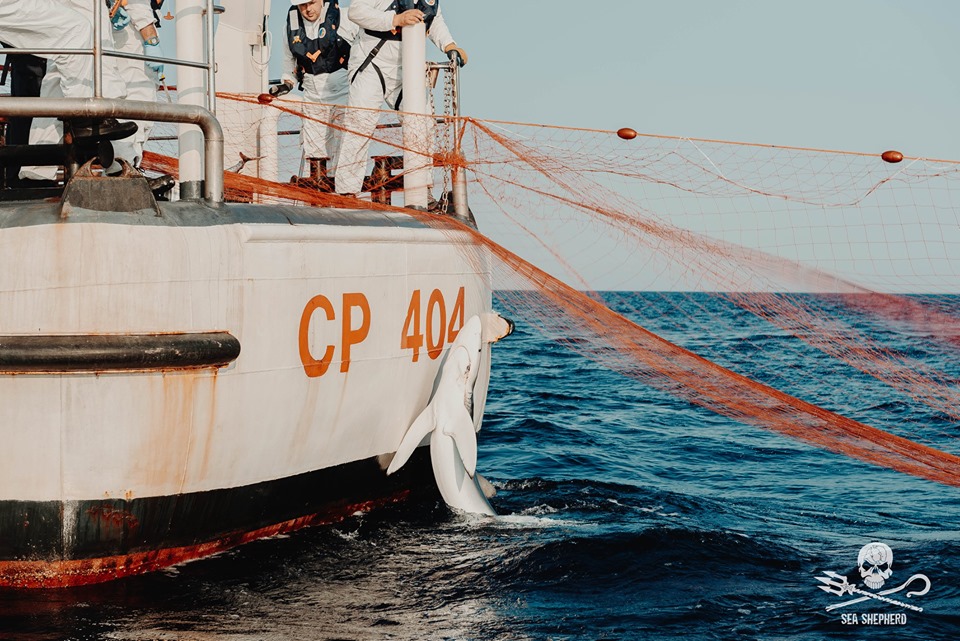
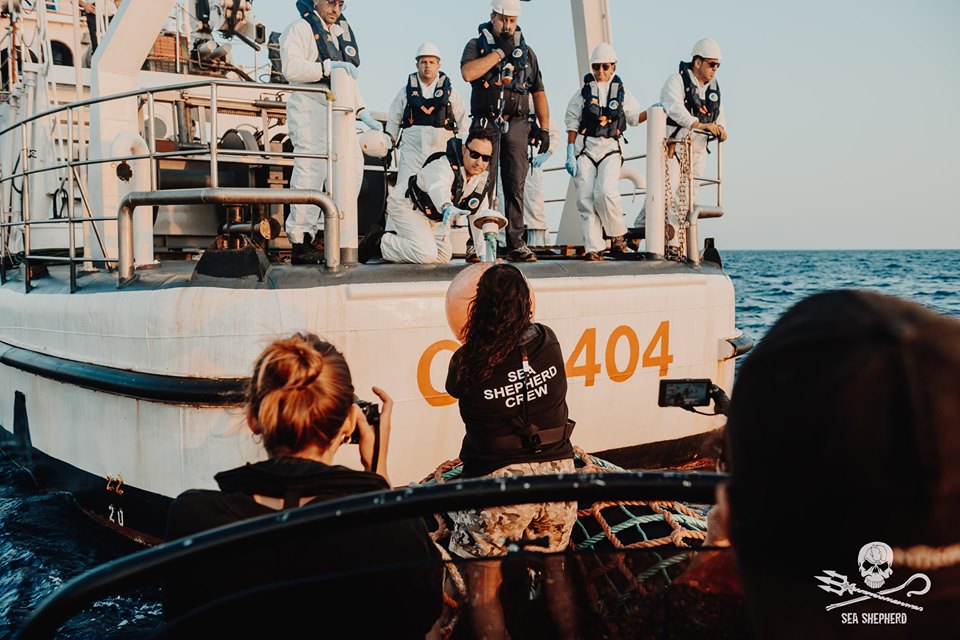
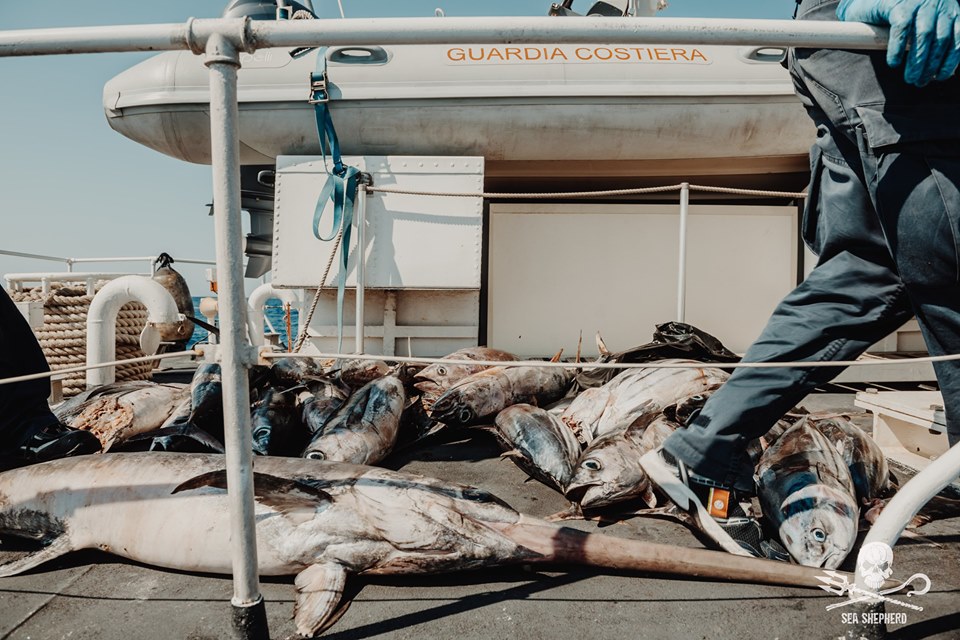
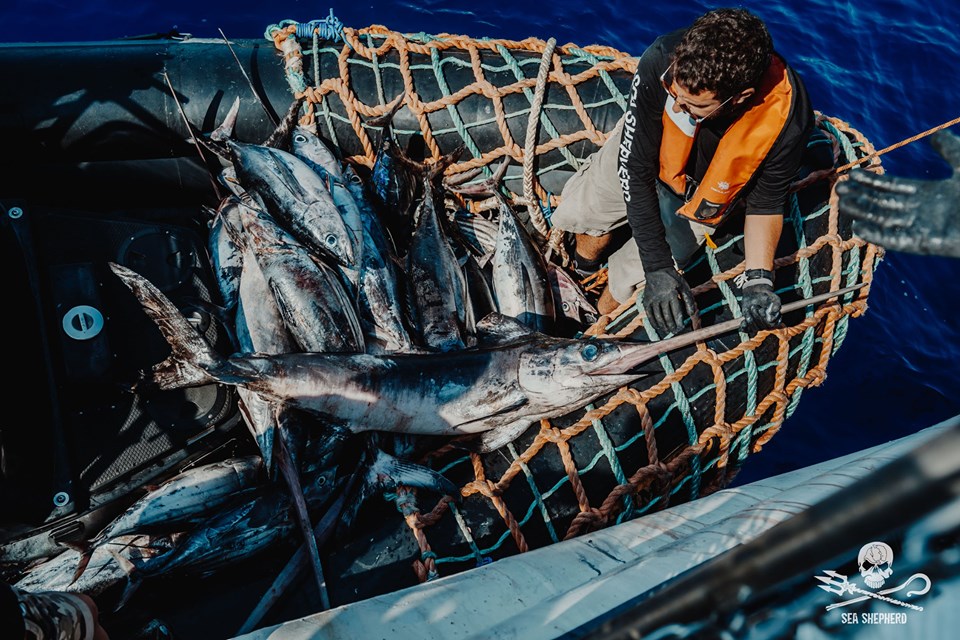
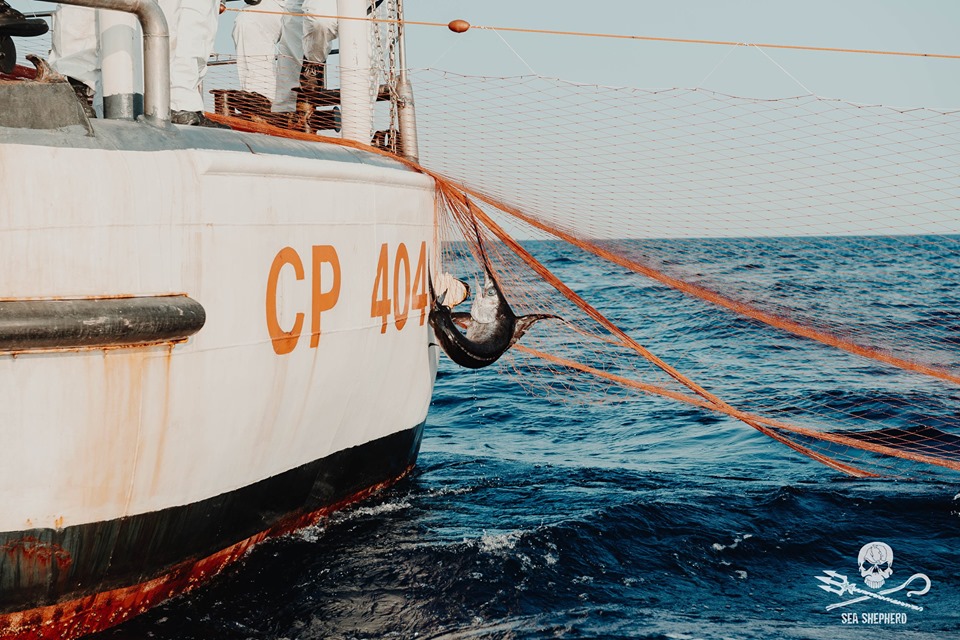
The Mediterranean Sea is the most over-exploited ocean of the world, 800.000 tons of fish are caught every year. Decades of eccessive fishing and the use of destructive catching devices have resulted in severe habitat degradation and an unimaginable decline of marine wildlife. With many migratory species passing through, the Aeolian Islands are particularly vulnerable habitat. Unless the threat of illegal fishing stops the area stops the area will soon be deprived of its diverse marine wildlife and the rich local ecosystem will not be able to recover. It’s up to us to act now.